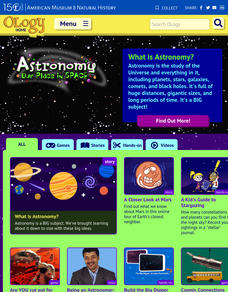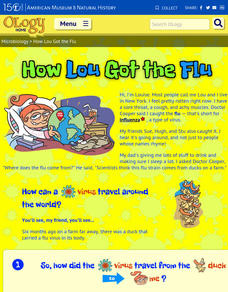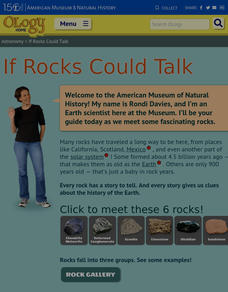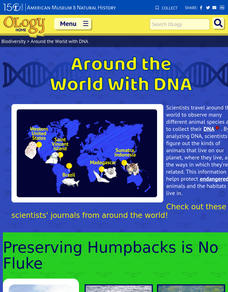American Museum of Natural History
Planetary Mysteries
A website all about planetary mysteries—it's a one-stop-shop for all things, stars, planets, and space travel. Scholars read an astronomy overview to discover the page's big ideas, then choose from the plethora of resources, including...
American Museum of Natural History
Space and Time
Carve out some time to learn about space-time. Young scientists use a remote learning resource to read up on the relationship between space and time. They consider the idea of relativity, see how objects with a large mass can bend space...
American Museum of Natural History
The Ancient City of Petra
Anyone who has seen Indiana Jones and the Last Crusade will recognize the entrance to the Nabataean city of Petra. Young archaeologists don't need horses or camels to travel through the Sig and tour this fascinating city, however. With...
Goodwill Community Foundation, Inc.
Helpful Phrases
Learning Spanish in the classroom is a lot different than using the language in a Spanish-speaking country! Beginning Spanish learners learn how to ask whether someone speaks English, if their conversation partner can repeat him or...
Google
The White House
Taking a guided tour through the White House would require extensive travel costs and an armed security escort—but a virtual tour only requires an Internet connection! A few clicks bring users through the historical corridors and rooms...
American Museum of Natural History
How Lou Got the Flu
Six questions probe participants to discover the possibility of catching a virus from others—even animals. Here, the influenza virus travels from duck to person in a round-about way. The quiz concludes with helpful tips to stay...
Goodwill Community Foundation, Inc.
Transportation
Are you going on a trip? ¿Cómo estás viajando? Whether Spanish learners are taking el avión, el autobus, or el tren, they'll know how to describe and pronounce their modes of transportation with an interactive Spanish resource.
American Museum of Natural History
A Closer Look at Mars
A website looks at how we know so much about Mars—telescopes, robots, and spacecraft—and the search for martian life. Following the informational text are three questions that quiz pupils about possible life on Mars.
Goodwill Community Foundation, Inc.
Directions and Distances
Describe where you are—and find out where you are going—with a beginning Spanish resource on directions and maps. Spanish learners repeat and practice direction words such as norte, este, and oeste, as well as measurement terms such as...
American Museum of Natural History
The Milky Way Galaxy
Just how big is the galaxy? Learners read information about the size of the Milky Way galaxy to better comprehend its size. Pupils develop an understanding of the number of stars in the galaxy by finding just how big a billion is and...
Goodwill Community Foundation, Inc.
Going Out
Let's go out to dinner! Provide early Spanish speakers with a quick reference guide and learning tool for common phrases related to a restaurant outing.
American Museum of Natural History
Saving Species
Some scientists dedicate their lives to researching and protecting endangered species. An online lesson teaches about three scientists around the world who do just that. They learn about spiders, mollusks, and reptiles from North...
American Museum of Natural History
If Rocks Could Talk
Meet some interesting rocks. Learners discover information about the three types of rocks and different rocks that are within each group. They read imaginary interviews with six rocks as each rock tells the story of their formation and a...
ProCon
Cuba Embargo
President John F. Kennedy bought 1,200 Cuban cigars the night before he enacted the Cuban trade embargo in 1962. Should the United States maintain the embargo? Using the website, pupils explore the topic to prepare for a class debate or...
American Museum of Natural History
Going, Going...Gone?
Young environmentalists consider how scientists are attempting to save endangered species. They read about what causes extinction and steps to take to minimize the threats.
American Museum of Natural History
Around the World with DNA
DNA analysis could be what saves some animals from extinction. An interactive lesson shows learners how DNA information proves variation among animals of the same species and how stakeholders use that information to make decisions. Easy...
American Museum of Natural History
All About Cloning
Start seeing double. The American Museum of Natural History website provides pupils with information about Dolly, the cloned sheep. Learners find out the procedure used to create Dolly along with why scientists clone animals.
American Museum of Natural History
Earthquakes Tremors From Below
Earthquakes are really no one's fault. A thorough lesson explains the different types of earthquakes how they happen. Learners interact with the online lesson to simulate earthquakes and examine their results. The lesson is appropriate...
American Museum of Natural History
The Amazing Mundo
Rocks and minerals are great on their own, but they also turn into some pretty amazing stuff! An online lesson explains the different types of materials we get from rocks and minerals, including glass, plastic, and coins. An embedded...
American Museum of Natural History
Around with World with DNA
A mammalogist, ornithologist, ichthyologist, and a conservation geneticist share their work and their hopes that their research will help protect and save endangered species and their habitats.
American Museum of Natural History
Fossils
Sixteen slides showcase an average day on the job for a paleontologist, Ross MacPhee. Engaging images include world maps and real-world photographs from an archeological dig in Antarctica. A brief description accompanies each slide.
PBS
Pbs Learning Media: Sagan on Time Travel
Astronomer Carl Sagan discusses the possibility of time travel in this audio-enhanced interview from the NOVAWeb site.
US Department of State
Us Department of State: u.s. Passports and International Travel
This website tells you how to apply for a passport as well as providing lots of information about traveling to other countries, e.g., what to do before you leave, what to expect in different countries, and where to get help abroad if you...
NASA
Nasa Star Child: Space Travel (Level 2)
This site has the history of space travel. Includes President Kennedy's speeches on the Apollo program that can be downloaded. Many graphics, and a very complete history of space travel with links to more detailed information.
Other popular searches
- Space Travel
- Space Exploration
- Travel Brochure
- Travel and Tourism
- Time Travel
- Pros Cons Space Exploration
- Creating a Travel Brochure
- Space Travel Brochure
- Travel Math
- Air Travel
- Space Exploration Timeline
- China Travel Brochure























